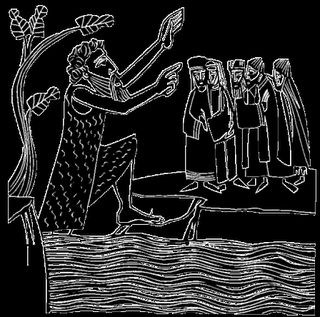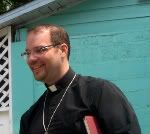a priest's musings on the journey
Saturday, December 09, 2006
Sermonette: 2 Advent C 11 November 2006 Prepare the Way of the Lord

Baruch 5:1-9
Jerusalem, take off your robe of mourning and misery;
put on the splendor of glory from God forever:
wrapped in the cloak of justice from God,
bear on your head the mitre
that displays the glory of the eternal name.
For God will show all the earth your splendor:
you will be named by God forever
the peace of justice, the glory of God’s worship.
Up, Jerusalem! stand upon the heights;
look to the east and see your children
gathered from the east and the west
at the word of the Holy One,
rejoicing that they are remembered by God.
Led away on foot by their enemies they left you:
but God will bring them back to you
borne aloft in glory as on royal thrones.
For God has commanded
that every lofty mountain be made low,
and that the age-old depths and gorges
be filled to level ground,
that Israel may advance secure in the glory of God.
The forests and every fragrant kind of tree
have overshadowed Israel at God’s command;
for God is leading Israel in joy
by the light of his glory,
with his mercy and justice for company.
Luke 3:1-6
In the fifteenth year of the reign of Tiberius Caesar,
when Pontius Pilate was governor of Judea,
and Herod was tetrarch of Galilee,
and his brother Philip tetrarch of the region
of Ituraea and Trachonitis,
and Lysanias was tetrarch of Abilene,
during the high priesthood of Annas and Caiaphas,
the word of God came to John the son of Zechariah in the desert.
John went throughout the whole region of the Jordan,
proclaiming a baptism of repentance for the forgiveness of sins,
as it is written in the book of the words of the prophet Isaiah:
A voice of one crying out in the desert:
“Prepare the way of the Lord,
make straight his paths.
Every valley shall be filled
and every mountain and hill shall be made low.
The winding roads shall be made straight,
and the rough ways made smooth,
and all flesh shall see the salvation of God.”
I was raised in a Pentecostal tradition and the idea of repentance was one that had been clearly inculcated in my spiritual experience already when I was six or seven years old. I remember walking the aisle and having the preacher say a prayer with me and asking God to forgive me of my sins and asking Jesus to come into my heart. Of course I had no idea what I was doing; I just didn’t want to go to hell, and of course I loved Jesus and wanted to be his friend. But let’s be honest, nothing really changed in my seven year old heart and life (partly because now I realize I was Christ’s already before that.) The real change came much later in my life; my true act of repentance happened while I was at Duke Divinity School, when I made the decision to leave the church of my youth and become a member a Church rooted in catholic Tradition and grounded in apostolic succession. This was a monumental, life-altering decision for me. I had to let go of everything I thought I knew about God and the Christian experience , and open myself up to new and unknown realities. In its essence that is what repentance is. Yes, it is often worked out in our lives by a willful turning away from our own selfish desires and turning towards God and God’s desires- and the result of this turning is sorrow for our sins that have offended God and a desire to do penance in thanksgiving for the mercy God gives us. However, repentance is much bigger than confessing our sins and asking for God’s mercy. Repentance is about lifestyle changes, shifts in worldview, and paradigm alterations. It is about being willing to turn away from the known and comfortable in our lives and experience with God in order to turn toward new realities that the Holy Spirit is bringing to pass. The Episcopal Church has been called to repent for having consecrated a partnered gay man to be bishop and for having installed a female Primate who supports the full inclusion of gays and lesbians in the Church; yet, the Episcopal Church has already demonstrated a spirit of repentance in following the Holy Spirit’s calling to turn away from the oppressive structures of an exclusive Institution and to turn back to God’s liberating reality of love and inclusion of every person has put on Christ in baptism and has confessed Jesus is Lord.
Both the Old Testament and the Gospel Readings speak of repentance. The Prophet Baruch*, who was the secretary of the Prophet Jeremiah, is writing to the people of God exiled in Babylon. In the section from which our reading is taken, the prophet is speaking words of hope and encouragement to God’s people. Using imagery familiar to us from Isaiah, he speaks of the day when mountains will be raised and valleys exalted and rough places made smooth so that the people of God may return to Jerusalem rejoicing, with no worries of barriers or obstacles. It is a lovely scene, in fact, to imagine a people formerly oppressed rising up, following God to liberation and redemption, and rejoicing and praising God as they turn away from bondage and oppression and turn towards a new reality of mercy and justice in God’s City of Peace. Jerusalem has fallen to Nebuchadnezzar and is in ruins; but there is hope. God will restore, God will redeem, and God will make Jerusalem a city whose glory is known in all the world- if the people of God can only repent and turn away from what they know in order to turn toward the dream of God for them.
St John the Baptist uses the very same imagery in his sermons on the banks of the Jordan. He too preaches words of comfort to those who would hear it; In the midst of the oppression that is alluded to in the roll call of tyrants and corrupt religious leaders, John declares, “the Lord is coming, and all people shall see the salvation of the Lord.” John preaches that the day of liberation has come, and that God will set us free. In order to receive this new reality, John calls the people of God to repentance. He calls them to turn away from their sins, their self-centeredness, and the old ways of living and knowing God, and to turn towards God, open to the new work that God is about to do in the world. As we repent, as we let go of our preconceived ideas of who God is and what God’s reign is like, and make room to let God be God and to let God’s Reign come into being as God wills it, then the rough places are made smooth, and the valleys are filled, and the mountains are made low, and the Lord is able to appear to us in all of God’s glory and we are able to experience and to participate in the salvation of God’s reign of mercy, love, and justice.
Of course the larger context here is the apocalyptic coming of Christ to once and for all establish the Reign of God and the Day of Peace when, truly and finally “all people shall see the salvation of the Lord.” But it also speaks to our need to prepare for that Day by preparing ourselves to know the reality of that Day even now in our own hearts and lives. John calls us too to repentance. We are called to make straight the roads in our soul so that the Lord may come to us unhindered. We are called to stop looking at our own desires and dreams, and to look at God’s desires and dreams for us. We are called to let go of what we think is right for us, and to accept God’s dreams for us. We are called to bear witness to God’s Reign and Christ’s Presence in the world by living holy lives, by loving our neighbor, and by incorporating acts of mercy and justice in our daily living. Only then is the way prepared for the Lord’s Coming; only then will it be possible for us to look East and to rejoice because the Lord is coming and because the Day is here when “all people will see the salvation of the Lord.”
* I am a sucker for Holy Tradition, in most cases. I am aware that Baruch was not the author, and that this was written hundreds of years after he and Jeremiah died.
:: posted by Padre Rob+, 8:39 PM
3 Comments:
i would have never imagined you as a 'pentecostal'. i just don't think it was "meant to be" (if there is such a thing).
thank God, you didn't become one, everyone else (except the pentecostals) would have missed out on your beautiful presence, not just episcopalians but other 'outsiders' such as me who benefit from your compassionate, and kind presence.
i appreciate your homilies and insights, i always find something wonderful from them.
peace and one love-
thank God, you didn't become one, everyone else (except the pentecostals) would have missed out on your beautiful presence, not just episcopalians but other 'outsiders' such as me who benefit from your compassionate, and kind presence.
i appreciate your homilies and insights, i always find something wonderful from them.
peace and one love-
, at 9:42 PM
This brought me peaceful thoughts.
I hope I'll help you write more and more sermons in the future.
In Christ's love,
Luiz
I hope I'll help you write more and more sermons in the future.
In Christ's love,
Luiz
Rob, thank you - in Wales they'd say you had 'hywl'!
Kind regards,
Julie/Juliet
Kind regards,
Julie/Juliet



